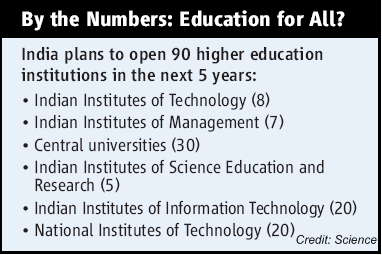|
|
|
|
|
|
|
News & Views item - July 2008 |
![]() Higher Education in India Gets an Upward Push Amid Cautious Optimism.
(July 8, 2008)
Higher Education in India Gets an Upward Push Amid Cautious Optimism.
(July 8, 2008)
This past January Indian Prime Minister Manmohan Singh promised: "Our government is committed to investing more, much more, in education, especially science education."
The Singh government's stated objective is to invest A$22 billion on higher
education -- a ninefold increase over the past 5 years. It intends to open six
Indian Institutes of Technology (IIT) this year with two to follow later on.
In addition 82 other institutions will be inaugurated, and according to Dr Singh: "All this marks a quantum leap in the infrastructure available for good-quality teaching and research."
And Graduate students will receive an increase of 50% in their living stipends while research associates are to get a 33% salary increase. While the monthly sums of A$420 and A$315 are small by Australian standards they are: "A long-felt legitimate need [that] has been met," says science minister Kapil Sibal.
But is India moving too fast? Will quality fall victim to this haste?
While the Singh plan is to add 90 new institutions of higher education to the existing 378 universities by 2013, the All India Council for Technical Education estimates almost a third of current faculty positions in academia are unfilled.
"I don't know from where quality faculty would come to teach in these new institutions," J. S. Rajput, former director of the National Council of Education Research and Training in New Delhi told Science.
Cal Tech's former President, Nobel Laureate, David Baltimore on a recent tour of Indian labs cautioned: "Don't do it too fast. Institutes are limited by the few good people who need to be nurtured. Build a couple of really fine institutions [in the next few decades]."
P. V. Indiresan, former director of IIT in Chennai, concurs: "Over-expansion of university education cheapens it. [Unfortunately India] prefers large quantity with bad quality rather than a small quantity of high quality."
However, Sam Pitroda, chair of the National Knowledge Commission in New Delhi, which advises India's prime minister, says that going slow just isn't an option and dismisses the criticisms: "There is still resistance at various levels in the government to new ideas, experimentation."
From an Australian viewpoint looking to India to overcome our shortage of "best and brightest" doesn't look to be a viable strategy.